
One special advantage of living in America was that it was possible to be weird and successful. The U.S. economy offered a lot of second chances and a high tolerance for unusual career arcs. There weren't exams (as there are in other countries) that tracked you from an early age, herding you into a career path or limiting your education opportunities.
There were plenty of good colleges and universities, and they all would take some unconventional students. There were a range of companies with different cultures and a general acceptance - even a celebration - of quirkiness. You could start a business, fail, and still succeed the next time, or just try something else. Some of the most successful Americans had nontraditional career histories, or declined to follow a linear, well-worn, rule-following path. Some - egad - didn't even go to elite schools.
U.S. meritocracy is not and never has been perfect, but traditionally it rewarded the unique and tenacious. Being born into the right family that shepherded you into the right schools certainty made life easier, but it was not a requirement like it was in other countries.
It doesn't feel like this is as true today. There are reasons to believe the economy no longer tolerates a wrong step, or even a step out of line. Getting a slot at a top university or program has become nearly impossible, even with perfect grades and test scores. It feels like you have to be in enrichment programs since birth and working on nuclear fusion in high school to get in. That may be because there is a bigger population wanting to go to these schools for the status and the real wage premium and access to top jobs they tend to offer.
The labor market also feels ruthlessly competitive. It's dominated by a few "superstar" firms, like Alphabet's Google or McKinsey that pay more than other employers, confirming a prestige that can be monetized. Success is no longer a factor of risks well taken. Getting on the track to success requires taking no risks at all, going to the right schools, acquiring the right network, living in a big city, and establishing an impeccable work history before you even start your career. There is less room for following your passion or taking a timeout for adventure, or for eccentric detours like working on a fishing boat in Alaska.
Every successive generation is told that success is harder than it used to be, and that there will be fewer opportunities without doing absolutely everything by the book. I was told that many times - when I went to college, applied to graduate school and got my first job. And it was never true for me. But I'm not sure I could have the same career if I was starting today.
I am a weird economist; always have been. I was not a traditional candidate for an economics Ph.D. because I was not remotely qualified or experienced when I started graduate school. But I was quirky. I'd been an indifferent and mediocre high school student and took some time off to travel in Eastern Europe. I stayed abroad and did my undergraduate degree in the U.K., which was unusual at the time. My travels and U.K. experience caught the eye of a professor at the University of Chicago who took me on as a summer research assistant after I sent him an email out of the blue. He was impressed with my diligence and curiosity that summer, and offered to help me get into graduate school in a good program. That started my career.
I wasn't typical for my time either, but being given a chance like that would be even rarer today. Now nearly all the economics Ph.D. candidates in top programs must have two years of pre-doctoral research before they even consider applying. Graduate programs are even harder to get into than doctoral programs, requiring students to have specific empirical skills to be productive. Why take a chance on someone untraditional? These "pre-doc" positions are incredibly competitive and require extensive quantitative skills, as well as a degree from an elite school in many cases. Perhaps some professors are taking a chance on students like me for a pre-doc. But it's a bigger gamble because a two-year full-time program is a much bigger commitment than my summer job based on a cold email.
As a graduate student I was interested in things like interviewing sex workers in a brothel about risk-taking - not normal for a retirement economist. I believe I can add something unique to the profession by exploring strange areas of the economy and communicating ideas to a wider audience than I would have done with a traditional research career.
And if you look at the CVs of many top economists, they were weird, too. They didn't necessarily study economics as undergraduates and they had unconventional work experiences. No doubt they are better economists because of their weirdness. Success in research isn't just about technical skills, it takes creativity and seeing the world a little differently than everyone else. It also takes initiative and the ability to ask some out-there questions.
What I see happening to the economics profession now reflects changes to the wider economy. Getting top degrees or jobs requires a near-perfect resume. This may only get worse now that some elite universities are dropping the SAT requirement. The entrance exam in the past was a way for quirky students to signal intelligence and potential, even if they lacked the wherewithal or desire to have a perfectly curated academic life.
It's a sad trend for the American economy and for a generation of students who feel like they can't afford to take the time to have the experiences that could help them figure out who they are. No wonder many young people are overwhelmed with anxiety.
But the marginalization of weirdness may not be sustainable. The economy still rewards creativity, self-sufficiency and ingenuity. The biggest rewards still go to innovators and people who see how to do things differently. This will only be more true as artificial intelligence becomes more pervasive in the economy. It does a great job finding solutions based on existing rules and information. It's less well suited for novel solutions to new problems.
Maybe it's true there is no room for weirdness if you want to go to Harvard University and get a job at McKinsey after you graduate. If top institutions take only people who do everything right, they'll be full of conscientious, hard-working people. But they will lack people who are creative and know how to take risks. And everyone will be keen to enforce the existing rules and norms that they are very good at following. These institutions won't be so successful at producing successful leaders - and they won't be much fun to work for, either.
If that persists, we could see a new cycle begin. All the weird people will go to less-elite schools and still get a great education and take an alternative career path. Employers will begin to see that as a signal of creativity and openness to new ideas and experiences. And in that case, maybe elite institutions will no longer provide the same rewards they used to, or be so important to a definition of success.
(COMMENT, BELOW)
Allison Schrager, a Bloomberg columnist, is a senior fellow at the Manhattan Institute and a contributing editor of City Journal.
Previously:
• The Fed's damage to the housing market may last years
• The future of unions looks very different
• To bring back the office, bring back lunch
• Does it really matter who gets into Harvard?
• Our pensions shouldn't be used to juice the economy
• A soft landing won't mean the economy is safe
• The 30-year mortgage is saving the U.S. economy … or is it?
• The one true secret to successful investing
• Less work, more burn-out
• When did risk become a bad word in the U.S.?
• AI-proofing your career starts in college
• Biden has to learn the same lesson as SVB
• Say it with Rubio: Changing clocks is stupid
• Sure, we'll return to the office in 2023 but not to stores
• How to manage the biggest risk of all: Uncertainty
• If you think U.S. pensions are safe, just wait
• Harry and Meghan and the perils of superstar culture
• Norman Rockwell's economy is never coming back
• Burned by crypto? Don't learn the wrong lesson
• Quiet Quitters are looking in the wrong place for meaningful work
• America's MBAs are the latest skeptics of capitalism
• Generation Z is getting a harsh lesson in stock risk
• The biggest threat to the U.S. economy is policymakers
• Buck up, boomers. You're still better off than your parents
• How to manage the biggest risk of all: uncertainty
• Startup boom is the kind of risk-taking Americans need
• Gen Z is too compliant to achieve greatness
• A bigger child tax credit isn't the poverty solution we need
• Finding your power in a higher-priced world
• The Biden administration's plans to double the tax rate on capital gains will prove costly to all Americans, not just the wealthy
• WARNING: Feel Good Now --- Pay Later: Stimulus is crammed with goodies but makes no economic sense
• The 'Stakeholder' Fallacy: Joe Biden's vision of capitalism is a recipe for failure


 Contact The Editor
Contact The Editor
 Articles By This Author
Articles By This Author